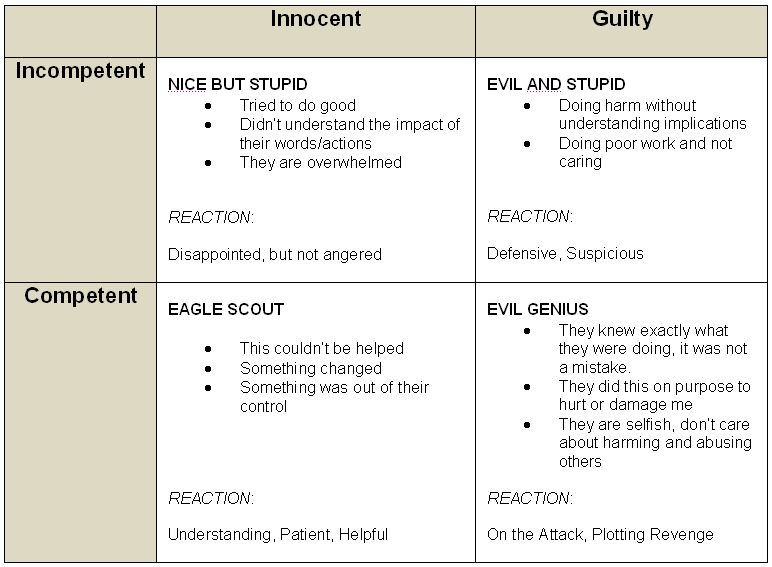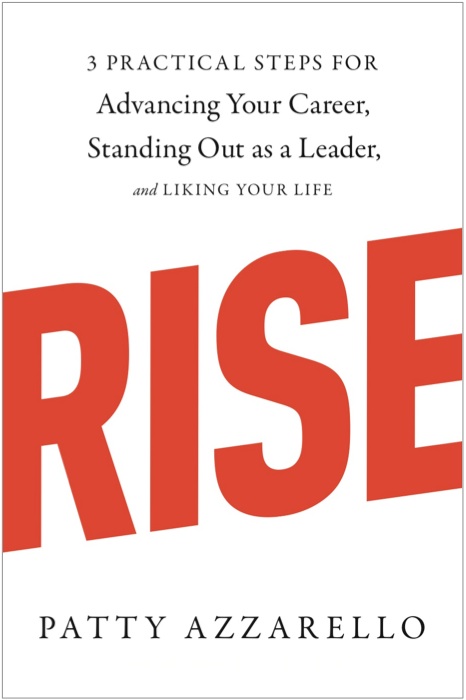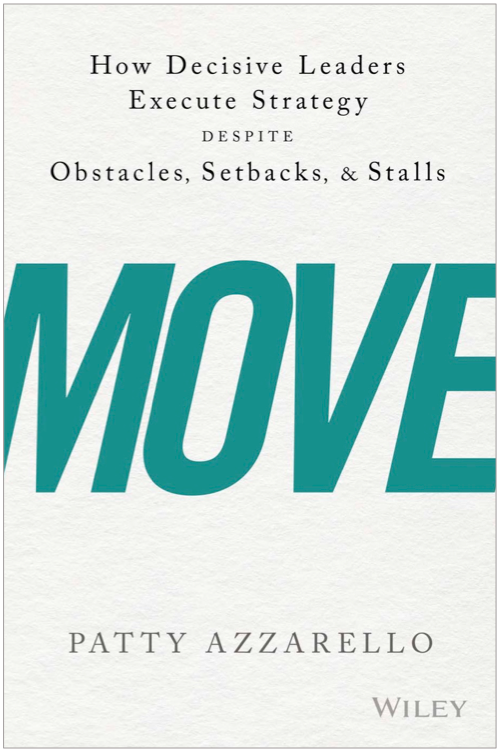Are your colleagues evil or just incompetent?
OK,”evil” is too strong a word, but what about those people that are “guilty”.
Guilty of not supporting you, putting obstacles in your way, and failing to deliver what they said they would?
Assumptions drive outcomes
Your assumptions about someone’s guilt or competence drive your reactions, your behaviors, and therefore the outcomes you get.
For example: If your spouse gets home really late without calling:
- If you presume innocence, you might worry that they are dead on the side of the road, and be hugely relieved and super-nice to them when they return.
- If you presume guilt you might think they are lying and cheating, and throw their clothes out on the lawn and lock the door.
What will you do?
How useful will your rage and accusations be if they got a flat tire and their cell phone battery died?
This type of mis-understanding happens all the time in business.
When someone makes a decision that harms you, or seems to be ignoring you, or goes back on a commitment, there is a tendency to assume the worst – They did it on purpose with full knowledge that it is bad for you. Guilty!
I reconstructed the table below from something I saw many years ago, but have been unable to find again. (If anyone knows where this comes from please let me know and I will fully attribute it!)

Why not Presume Innocence First?
Get some data.
Find out what really happened before you jump to the conclusion that the person is an evil mastermind, plotting against you, on purpose, with great skill and precision.
For example:
If a colleague promised to give you some help on something that was vitally important to you, and then failed to do so:
If you think they are Guilty and Competent…
You might believe that they knew exactly what they were doing, and chose to leave you hanging. They lied. You might think that they are setting you up to fail, to ruin your reputation, or keep you from succeeding or advancing. They don’t care about you.
You might get angry and accuse them of doing the wrong thing on purpose.
You might confront them, or pick a fight. You might start telling other people what a selfish, closed-minded jerk they are. You might try to find a way to get back at them, or harm their reputation.
But what if you were wrong?…
What if they are Innocent?
If you start with the presumption that they are innocent, you might think: There must be a reason they didn’t they do what they said they would do.
You would want to find out what happened.
What do they know that you don’t? What changed since the agreement?
You might learn that there was a good reason they didn’t do what was expected, and that they are still planning to help you. Or they did do it, but it got blocked somewhere before it reached you. Or someone down the line changed it, or gave you the wrong information about what happened.
Good Outcome:
With the knowledge that this is a competent person with good intentions, you can still get what you need, because you didn’t piss them off by telling them how horrible they are. You didn’t throw them under the bus.
You preserved the relationship by being respectful and focused on the facts and the outcome. You might have even learned something about how the system works, so you can avoid this happening again.
If you had presumed Guilt and you were wrong…
You could have made an enemy out of a competent person who can actually help you.
You could have burned up a lot of energy, only to ruin a valuable relationship and dig a hole for yourself.
Not only wouldn’t you get what you needed, you might also have damaged your own reputation by speaking badly of someone who is highly respected.
What if they are just Incompetent?
It’s tempting to jump to the Evil Genius conclusion when someone’s actions harm you.
But, if you start with the presumption that the person is incompetent, not out to get you, just unable to help you, you might think differently. Although the person didn’t do what was agreed, it wasn’t malicious.
Find out what really happened.
What got in the way? Did they try?
They, in fact, had the best of intentions. You might find out they just didn’t get to it yet. They might be overwhelmed with other things. Or that they didn’t realize what the measure of success or quality was. They did their best but messed something up. Perhaps the task was simply beyond them.
You might offer some assistance to them. Help them help you. You could give them another chance.
Good Outcome:
It’s still frustrating if you didn’t get what you need, but as least you have not wrongly accused someone of malicious intent.
With the facts, you might both decide that after all, that as much as they’d like to help, they actually don’t have the capability to help you. You move on, you move forward.
If you had presumed competence and were wrong…
You would blame them for choosing not to help, instead of understanding that they didn’t harm you on purpose. You wouldn’t get what you needed and you might have made an enemy of a person who was inclined to help you.
Get the facts before you react
In my experience, you always get a better outcome if you presume Innocence first. And you most definitely get a better outcome if you get the facts about why things happened the way they did before you make any judgment, about someone’s Guilt or Competence.
If you presume innocence first, you are more likely to be able to get the facts because you won’t be putting people off, or making them defensive in the process. Then you’ll have real data to work from.
But what if they ARE guilty?
If after you get the facts, you discover they are indeed Guilty — they really don’t support you, they are ignoring you on purpose, they are out to sabotage your career, make you look bad, or throw you under the bus, you’ll have more facts to deal with that too!



